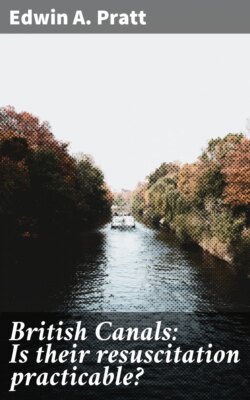British Canals: Is their resuscitation practicable?

Реклама. ООО «ЛитРес», ИНН: 7719571260.
Оглавление
Edwin A. Pratt. British Canals: Is their resuscitation practicable?
British Canals: Is their resuscitation practicable?
Table of Contents
PREFACE
LIST OF ILLUSTRATIONS AND MAPS
CHAPTER I. INTRODUCTORY
CHAPTER II. EARLY DAYS
CHAPTER III. RAILWAYS TO THE RESCUE
CHAPTER IV. RAILWAY-CONTROLLED CANALS
CHAPTER V. THE BIRMINGHAM CANAL AND ITS STORY
CHAPTER VI. THE TRANSITION IN TRADE
CHAPTER VII. CONTINENTAL CONDITIONS
CHAPTER VIII. WATERWAYS IN THE UNITED STATES
CHAPTER IX. ENGLISH CONDITIONS
CHAPTER X. CONCLUSIONS AND RECOMMENDATIONS
APPENDIX. THE DECLINE IN FREIGHT TRAFFIC ON THE MISSISSIPPI
Footnote
INDEX
Отрывок из книги
Edwin A. Pratt
Published by Good Press, 2021
.....
At the Manchester meeting of the Association of Chambers of Commerce, in September 1904, Colonel F. N. Tannett Walker (Leeds) said, during the course of a debate on the canal question: "Personally, he was not against big trusts run by local authorities. He knew no more business-like concern in the world than the Mersey Harbour Board, which was a credit to the country as showing what business men, not working for their own selfish profits, but for the good of the community, could do for an undertaking. He would be glad to see the Mersey Boards scattered all over the country." But, even accepting the principle of canal municipalisation, what prospect would there be of Colonel Walker's aspiration being realised? The Mersey Harbour Board is an exceptional body, not necessarily capable of widespread reproduction on the same lines of efficiency. Against what is done in Liverpool may be put, in the case of London, the above-mentioned waste of public money in connection with the control of the Thames steamboat service by the London County Council. If the municipalised canals were to be worked on the same system, or any approach thereto, as these municipalised steamboats, it would be a bad look-out for the ratepayers of the country, whatever benefit might be gained by a small section of the traders.
Then one must remember that the canals, say, from the Midlands to one of the ports, run through various rural districts which would have no interest in the through traffic carried, but might be required, nevertheless, to take a share in the cost and responsibility of keeping their sections of the municipalised waterways in an efficient condition, or in helping to provide an adequate water-supply. It does not follow that such districts—even if they were willing to go to the expense or the trouble involved—would be able to provide representatives on the managing body who would in any way compare, in regard to business capacity, with the members of the Mersey Harbour Board, even if they did so in respect to public spirit, and the sinking of their local interests and prejudices to promote the welfare of manufacturers, say, in Birmingham, and shippers in Liverpool, for neither of whom they felt any direct concern.
.....